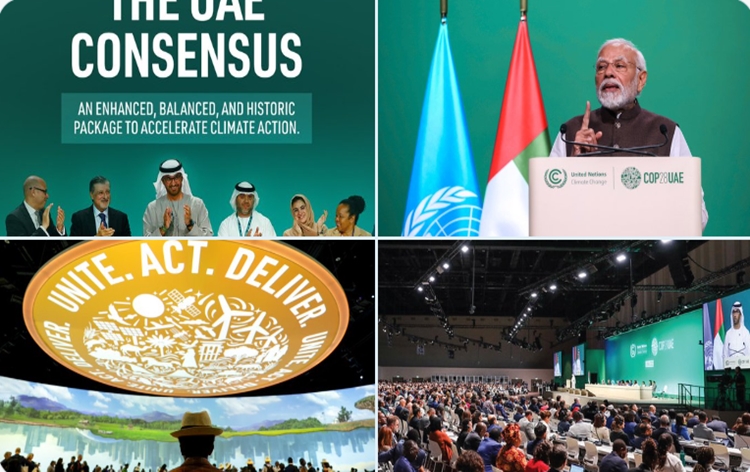The 28th Conference of Parties (COP28) to the United Nations Framework Convention on Climate Change concluded with a groundbreaking decision – the “UAE Consensus” – marking a historic step towards addressing the climate crisis. However, the agreement has stirred debates due to perceived discrepancies between words and actions and a lack of financial commitments.
Addressing Fossil Fuels
For the first time, participating parties agreed to confront the issue of fossil fuels, recognizing the imperative for a “fair and equitable” transition away from them. The appointment of Sultan Al Jaber, CEO of the Abu Dhabi National Oil Company, as COP28 President raised concerns about potential industry influence, but the decision to address fossil fuels was widely praised as a pivotal move.
Negotiations and Challenges
Extensive negotiations and multiple drafts were necessary to reach the final agreement, extending the conference past its scheduled closure date. The Presidency underscored the need for ambitious language to limit global temperature rise to 1.5 degrees Celsius, describing it as the “North Star.” Despite these efforts, the final decision left some developing countries dissatisfied.
Developing Nations’ Concerns
Several developing countries, including Bolivia, Cuba, China, and members of the “G-77 and China” group, expressed dissatisfaction with the final text on fossil fuels. They argued that it undermined principles of equity and climate justice. Developing nations emphasized the absence of concrete financial commitments for their transition away from fossil fuels, raising questions about the global commitment to climate action.
Financial Commitments and Loss and Damage Fund
Finance emerged as a significant sticking point at COP28, with developing countries highlighting its essential role in climate action. Despite the UN Convention’s mandate for developed countries to lead in funding climate efforts, specific financial commitments were conspicuously absent. The launch of the Loss and Damage Fund did not mitigate concerns, as developing nations questioned the lack of transparency in tracking and measuring finance flows.
Unmet Pledges and Conflicting Figures
The 2010 pledge by developed countries to mobilize $100 billion annually by 2020 to assist developing nations was a central point of contention. Leaders from developed countries referred to reports suggesting goal achievement, but the lack of a transparent mechanism to track finance flows cast doubt on the accuracy of these claims. Conflicting figures from independent reports further obscured the true financial picture.
Negotiations for a New Financial Goal
Negotiations for a new financial goal, the New Collective Quantified Goal on Finance (NCQG), were underway at COP28. Developing countries advocated for a science-based approach and a robust mechanism to track progress, while developed countries pushed for the inclusion of Article 2.1(c) of the Paris Agreement, allowing them to withhold funding for projects they deem insufficiently climate-friendly.
Contradictory Fossil Fuel Projects
Despite advocating for fossil fuel phase-out, the US remained the top producer and consumer of crude oil globally. A September report identified the US, Australia, Canada, Norway, and the UK as major contributors to oil and gas exploration. These countries, while supporting climate goals, plan to develop over half of the projected oil and gas fields by 2050, revealing a contradictory stance.
Important Questions Related to Exams
Q: What was the key outcome of COP28?
A: COP28 achieved a historic milestone with the “UAE Consensus,” addressing fossil fuels for the first time, signaling progress in the fight against climate change.
Q: Why are developing nations dissatisfied?
A: Developing countries, including China and Bolivia, are unhappy due to perceived equity issues and the absence of concrete financial commitments for transitioning away from fossil fuels.
Q: What role did finance play at COP28?
A: Finance emerged as a significant challenge, with developing nations highlighting the lack of transparency in tracking financial commitments, especially the unmet $100 billion annual pledge by developed countries.
Q: What’s the status of fossil fuel projects despite the COP28 agreement?
A: Despite advocating for fossil fuel phase-out, the US and other major countries remain top contributors to oil and gas exploration, revealing a contradiction in their climate stance.




 GIFT City and GTU Collaborate to Advance...
GIFT City and GTU Collaborate to Advance...
 UIDAI Partners with ISI for 5-Year R&...
UIDAI Partners with ISI for 5-Year R&...
 BSNL Signs MoUs with Global Tech Giants ...
BSNL Signs MoUs with Global Tech Giants ...

